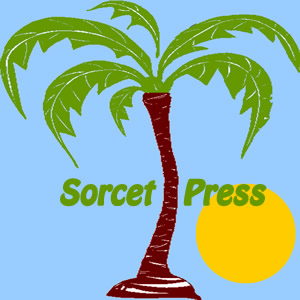|
Interviews
Stephen Morrill on Smashwords speaking about his Mangrove Bayou mystery series, his Cord MacIntosh mystery series, his Sorcet Chronicles fantasy series, his writing history, and the writing life in general .
|
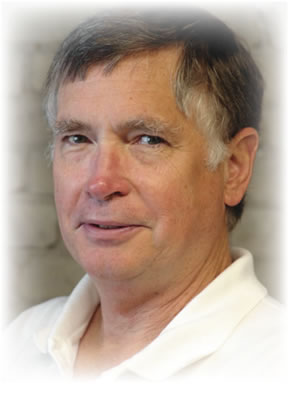 |
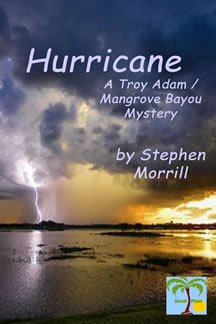 |
What do your fans mean to you?
Fans are fellow-travelers on a road where I am only the guy who paints the white stripe down the middle. Once upon a time I had a sideline of guiding canoe camping trips through the Everglades National Park. I was the guide, others followed, but we all saw the same things, had the same experiences.
Writing and reading fiction is much the same. There’s an agreement, a contract. I — the author — will lay out a road and paint the lines. You — the reader — are free to follow the road or to leave and go in another direction. I promise to be as accurate as possible with facts, and as interesting as possible with the story line. You, the reader, promise to give me a reasonable chance to satisfy your curiosity about the story.
I see little difference between reader and writer here. I may have the technical expertise to create the story (and get it into publication, no easy task). You may have that too, though most don’t and it’s not necessary. But, in a way, we’ll all in the same boat, seeing the same things and enjoying the trip. |
Are you a plotter, outlining your story and creating biographies of your characters? Or are you a "pantser" letting the story develop as you write?
Perhaps as a result of a thirty-year career writing nonfiction, I plot everything. Extensively. And I have, for each series, a character "bible" describing all major and some minor characters. I have maps of Mangrove Bayou (for that mystery series) and of Tessene (the world of the Sorcet fantasy series).
I don't understand "pantsers" who say their characters tell them what to write. My characters work for me and, by God, do as I say. Most of the time anyway. Sometimes I have to take Troy Adam or Cord MacIntosh or Tachi (my protagonists) out to the woodshed and beat the tar out of them because they tend to be wisecrackers.
I write out plots using a large spreadsheet. I reserve the right to change things but I consider having an outline essential to professional (and completed) work. Pantsers, in my experience, never finish anything. Maybe their characters went on sabbatical and aren't phoning it in any longer.
Mangrove Bayou and your police chief Troy Adam are unique. Where do you get those plots?
I collect news stories that I use to plot future books. Most of the plots are things that actually happened and I just save stories from the newspapers and modify them to my needs. In Florida there’s no need to invent crimes; there’s no end to odd crime or Florida weirdness. I also have a P.I. series (my Cord MacIntosh books) and that has some crossover with the police procedural series. |
How much of you or your experience is in your novels? How close are the characters to your own experience?
Most fiction is autobiographical to some degree. I recall a writer with a tee-shirt that read, "I'm a writer. Be nice to me or I'll put you into a novel and kill you." I’ve had friends ask if they’re in my books. I just smile and say, "It's all right. I change the names." They don't always seem reassured.
I once met a fellow mystery writer for lunch at a hotel in Sarasota. He pulled into the front entrance, got out and handed his car keys to a valet and said to me, “I once killed a man on the sixth floor here.” The valet’s eyes got very round and he was especially careful as he drove my friend’s car away.
Most of my characters aren't modeled on any one person but are combinations of several people I know or observed. Some are totally made up (I don't actually know any murderous archaeologists or serial killers or vampires) but even then I usually do research.
|
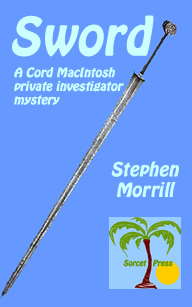 |
I also try to write "against type" when I create a character. Make them somehow different from what the reader expects. A police chief in a southern town who is not a redneck but classically educated. His girlfriend is a pilot who does her own maintenance on her ageing aircraft. A slime-covered fishing guide who quotes Dickens or Conrad. One of my favorites is a black gang leader who has a Ph.D. in Shakespearean studies. He quotes Othello a lot.
Take my Troy Adam / Mangrove Bayou mysteries for example. I’ve never been a cop or an orphan but Troy Adam is, more or less, what I would be if I were the police chief. Incidentally, the Tampa Police Department put me through their multiweek “citizen academy” course last year. They thought that, if I wrote police procedurals, I should learn more about police procedures. Go figure.
With my Cord MacIntosh P.I. mystery series I suppose I tried to write Cord to be almost the opposite of me but even there I see some similarities. He's ex-Army, and so am I. He's been a mercenary and I have not (but I was asked to become one at one point). He likes sex with lots of women. I like sex but not with every woman I meet. He insists that he has never experienced or understands love. I have and do. He goes to church every Sunday. I don't. He lives on a sailboat. I've thought about it but it's impractical.
With Tachi, my protagonist for the Sorcet Chronicles fantasy series, I can't really say if it's biographical since that's set in an alien world with different people. Maybe Tachi is me or vice-versa. I'll let the reader decide .... |
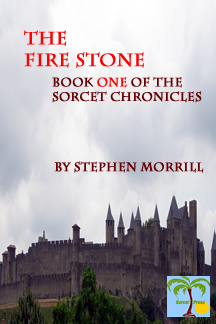 |
What aspects of the series have you had to fact-check, if any? And what was your most exciting topic to research?
I fact-check everything, and all topics are exciting. One thing I have learned in 35 years earning my living as a writer: any time I don’t bother to fact-check because, well, I just know what’s true — I'm wrong. I look up Florida statutes. I research weapons, boats, trucks, whatever. If it’s mentioned, I’ve looked it up. And I love the Web. It’s a Godsend to me. I’ll also use the Google-map functions to describe buildings or scenery I’ve not actually visited. This is seriously helpful to a writer.
I do take some intentional liberties with some things. A criminal case, in reality, takes months, years even, to be processed. We all know that. When my guys send something off to the lab for analysis, they get a response in days, not months. But this time-scale compression is standard in books and TV shows too. I think the readers understand. |
What's the story behind your latest book?
Which latest book? I’ve written (at last count, end of 2018) 17 books. Last nonfiction book was Fearless, a ghosted book for a man with a syndicated newspaper cartoon strip. That was weird but I think we did a good job together.
Well, all right, fiction. E-books on Smashwords and Amazon. Let’s try this:
The Cord MacIntosh private investigator series. Two books. The most recent, “Black Stone” has Cord in Key West, bodyguarding an author whose book has offended 1.5 billion Muslims, some of whom wish to kill the author. Cord wonders of he can keep Mahdi alive. When the bombs and bullets start to fly, Cord wonders if he can keep himself alive. I also wrote the book because I always wanted to feed someone to a shark.
The Sorcet Chronicles, a four-book fantasy series. In “The Waterstone” Sorcet, our druid, and Tachi, her guard sworn to die for her or at her command (and the narrator) close the final portal. The ending is so weird I refuse to tell you here. I also wrote the series while amassing a lot of detail about the world of Tessene and I may do other books set in that land. We shall see ....
The Mangrove Bayou police procedural series. Chief Troy Adam is faced with vampire killings. No, the vampires aren’t killing people; someone is killing them. Then Troy learns there really are such people. Then he has to find the killer while not getting fanged himself. I admit to wanting to write about vampires but not in the usual way. Plus, the local cops put me through a training course and Tased me and I needed to add that scene to the book. Buy the book; it’s electrifying .... |
When did you first start writing?
Writers, authors, often cite their childhood. They started writing as a kid with a crayon. Or they learned in school. I did none of that. I could hardly be bothered to write a note to mail to my mother, let alone anything more ambitious. But something inside me made me always wonder if I could be a writer. I always had a great vocabulary and a decent understanding of grammar — gleaned entirely from voracious reading, not from formal education. But it was Mensa that kick-started my writing career.
Mensa? In the 1970s-1980s I served as both the LocSec (sort of the president) of the local group and also as its newsletter editor. That newsletter was a 40-page thing and I had to write most of it every month. This, while also holding down a job at the port of Tampa taking care of ships that was 24/7/365. It was tough to do both but I learned how to write, how to meet a deadline, how to prep for publication, everything to do with what amounted to a small magazine. In the three years I did the newsletter Mensa awarded me “Best” prizes in several categories.
|
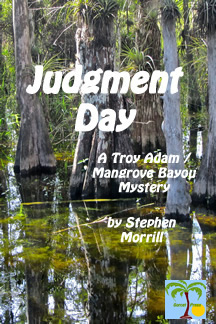 |
In 1982 I decided to try my hand at nonfiction writing, working at it part-time in evenings and weekends. I wrote for several local magazines and also did some corporate work. by 1984 I was making good money at this and my schedule was so full of writing jobs that I quit my port job to have more time for writing. I’ve been a full-time freelance writer ever since.
A few years ago I decided to try writing fiction. These are all available as e-books on Amazon or Smashwords:
My Cord MacIntosh private investigator books came first. I wrote the first of those with one protagonist, with two, even with a female lead. I was experimenting. The final version is the best and I decided to stop abusing it. But I learned so much about fiction writing.
Next came fantasy. I like reading fantasy, swords and sorcery. But most of the plots I read featured groups of people — adventurers, if you will — who behaved stupidly. They would break up and go off in different directions, meaning, as we all know, they got gobbled individually by the dragon. This stupidity used a a tensioning device just annoyed me. So I set out to create a series where the heroes aren’t stupid. I also loved the Morgaine four-book series by C.J. Cherryh — which was not stupid — and even asked her to write more. But she had moved on in her writing and so I more or less copied her format and wrote my own. |
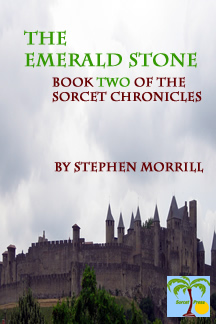 |
In my Sorcet Chronicles, Sorcet is a deru (think druid) who is out to close the portals and who is accompanied by her bodyguard (and the protagonist) Tachi, a ‘taidar’ sworn to die to protect her to die at her command. It’s dark. It’s smart. It’s funny in places; all my books are funny in places.
Next came the Mangrove Bayou police procedural series. My favorite mystery writer was Robert B. Parker who wrote the Spenser P.I. series, the Jesse Stone/Paradise, Massachusetts police procedural series, and much else. I especially loved Jesse Stone and the funky town of Paradise, Massachusetts.
Then Parker died. I was aghast and bereft, something I write just to prove I have a vocabulary. I moped around. Then I told myself, “Steve,” (because, being a hermit, I talk to myself, or to Spots the cat), “you have covered the police and the courts for Reuters. You’ve read mysteries from John MacDonald to Robert B. Parker. You could do this.” Thus was born Troy Adam and Mangrove Bayou, Florida. These stories have one central plot and some side plots. (You should see the outlines needed to mesh four or five different stories. Huge.) Enormous fun to write and, I hope, enormous fun to read.
Buy one. Let me know ... |
What is the greatest joy of writing for you?
I started in nonfiction. Magazines, newspapers, nonfiction books. I did not enjoy every person to whom I talked, or every story I wrote. But I always enjoyed getting to know people of all walks — I’ve interviewed everyone from Bill Clinton (that man could sell snowballs to Eskimos) to Dick Cheney (a jerk) to the governor, to most of the business leaders around here, even to my local trash collector. All were fascinating in their varied ways.
And I got to play with expensive equipment: I once crashed a 747, luckily in a trainer. I once did a “trap” landing on an aircraft carrier and then days later was shot off again (zero to 120 knots in two seconds, try that you Porsche owners). I’ve sat in courtrooms watching a serial killer and, separately, a spy, being sentenced. Courtrooms are seriously boring but the cops are always fun to be around. And, yes, they really do like to eat doughnuts.
But the most fun of all is writing fiction. I GET TO MAKE STUFF UP! Or so I thought when I started. I had spent many years needing two sources for every fact, of seeing that I quoted people accurately, of poring over every story to fact-check it. The people who think professional news organizations are fake news have no idea of the work and care that goes into news writing. Mistakes can happen but they are rare. |
But then I found that I needed to check facts in my fiction too. That was a major disappointment. Now, while writing mysteries, I write on one of three screens, with the internet open on the screen to my left and my character “bible” on the screen to the right. I look up everything. Experience has taught me that when I think I know something or how to spell something or some detail about something — I’m probably wrong. Look it up.
This is important. Recently I started to read a mystery by another author. Somewhere around page 20 she referred to a B-52 aircraft as a cargo plane. I hurled the book across the room and never finished it. A B-52 is a bomber and it’s been so since the 1950s — most of the planes are older than the pilots flying them.
Another writer showed me his mystery manuscript. He had a sheriff in every town in the Florida Keys. I saved him on that one, pointing out that by old English tradition followed in every state in the U.S. too, there was but one Sheriff per county. Monroe Country (the Keys) therefore has one sheriff, whose main office is on Stock Island next to Mount Trashmore. I know; I’ve been in the office. I research things. You have to be accurate with the facts that the reader can look up or you get nasty feedback that you deserve. |
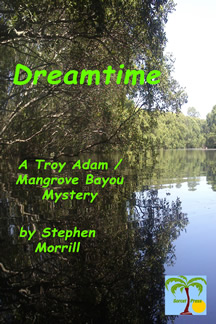 |
Well, you say, at least you don’t have to look up facts when writing fantasy. It’s ALL made up, right? Yes, it is. But that also means I have to keep track of the description of everything I made up, so as to be consistent. I also have then to somehow explain to he reader — without stopping the plot dead — that a “fert” is sort of a 120-pound cat while a “calcor” is sort of a crocodile. That sort of thing.
Still, fiction is a blast to write. I hope you enjoy reading my books as much as I enjoy writing them.
Where did you grow up, and how did this influence your writing?
I'm an Army brat. By age 30, when I came to Florida, I’d lived in 26 cities in six countries. My father was a 34-year career colonel. In fact, I was, in a way, "in" the Army for those 30 years, first as a dependent and later as a soldier myself.
I think this was a wonderful education in itself, learning to cope with varied cultures and languages. At one time I could navigate my way around Tokyo using my Japanese and I learned French in college well enough to visit there on weekends when I was stationed in Germany. (Today my French has largely abandoned me and Japanese is but a memory.) |
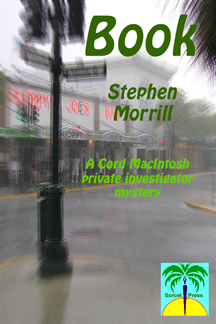 |
I attended colleges in Kentucky, Kansas, Chicago, Maryland, Oklahoma, Florida (2). I spent a total of seven years in college, amassing about 180 credit hours but without qualifying to graduate from any of them. With so much college, and such varied majors (history, political science, biology, philosophy, even marine science here in Florida) and my own reading, I am what educators call an autodidact.
In the middle of my brilliant college career I took a break to join the Army. They sent me to Germany (my third time there) as an enlisted man and then the Army kindly sent me to Officer Candidate School and I then spent time in Vietnam killing little brown people on behalf of old white people.
Out of the Army, I found myself stateless. My career-Army dad had retired and I had to pick my own place to live. I went back to college, choosing to live in Florida, a place everyone else dreamed of retiring to. Good decision. Lots of water activities (SCUBA, canoeing, sailing) that I liked to do. Worked at Tampa’s port for 15 years, taking care of ships as an owner’s rep. Loved that job but thought that maybe I could be a writer. Quit the port job and spent (so far) 35 years as a freelance nonfiction writer and lately a fiction author. Wrote thousands of magazine articles and also news stories for Reuters. Edited several magazines. Wrote some nonfiction books — several ghosted books, travel books about Florida, and some other nonfiction books for a military press — and now have done (at last count) a dozen fiction books, mysteries and fantasies. Fun! |
I learned from all this:
-
Moving so often as a kid meant no lasting friendships with others. Probably accounts for my preference today to be alone. This is a good thing for an author, as it happens.
-
Writing skills, obviously. I wasn’t all that good at first. 35 years knocks off the sharp corners and I got better at the technical aspects. I’m still learning. I’ll always be learning.
-
I had intended to make a career of the Army. My father was a 34-year colonel (four years enlisted, 30 as an officer) and loved it. I decided that I did not. Too much of a free spirit. Wanted to be my own boss. Tended to disrespect authority. Almost got court-martialed once for refusing to obey an order that I thought stupid and likely to get U.S. troops killed.
|
-
I like jobs where I work alone, and am responsible to no one but me, and which other people have a hard time “pigeonholing”. Even in the Army I managed this feat but the ultimate is sitting alone in my house/office, writing all day, the closest thing to being a hermit that I can manage.
-
I have a very high I.Q. and, like too many such, have a hard time sitting in classrooms listening to lessons that seem to procede at a turtle's pace. Smart people can get bored and then they get bad grades. At least I did. I bounced from one dean's list (scholar) to the other (ought to kick this guy out, he's so obnoxious). But in the Army I learned the value of every person and not to be such a know-it-all jerk. Each of us is a biography, an entire life of experience.I find that fascinating.
- Last, I have reflected back, many times, on what sort of person I was ten years abo. I always cringe at two things: First the times back then when I behaved like a jerk. And, second, the realization that, ten years hence, something I'm doing now will make me seem like a jerk. That knowledge is truly humbling, or at least I think so.
As for growing up, I'm still growing up. Get back to me on that.... |
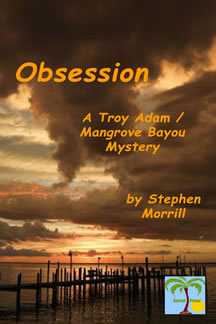 |
Describe your desk
My desk? Glass-topped, large, wraps around a corner of my office. Office is the front side room of a 95-year-old bungalow. Once upon a time, I suppose, this room was the “parlor” where eager young damsels sat waiting for young gentlemen to call upon them. Today, the only person calling is Spots, the 20-pound Savannah cat. He has his own sleeping pad on the left side of the desk, complete with heating pad in the winter. (Winter is sort of relative here in Florida and usually that’s the only heat turned on in the house.)
I use a Mac computer and three 30-inch screens. I like plenty of real estate to spread out my manuscript, my outline, my character “bible”, my to-do list, my ... you get the idea. Also have a land-line phone with headset for interviews, the usual office supplies, a temporary storage for papers. Walls of the office (in fact most walls throughout the house) lined with bookshelves.
Nice view out the front across a full-width screened porch to my yard and plants and a quiet two-block street. Side window looks out on the 'porte cochere' and my car. Used to have a 22-foot sailboat in there but that’s another story ... |
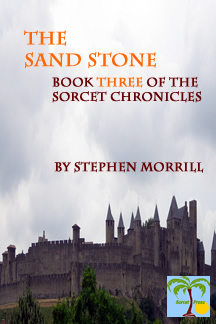 |
Who are your favorite authors?
I have to list Robert B. Parker first. I loved his Spenser private investigator mysteries (Parker is credited by some with reinventing the hardboiled P.I. genre) and also his Jesse Stone / Paradise Massachusetts police procedurals. When Parker died I decided that, as I couldn't read more of his writing, I'd do my own and thus came about my Troy Adam / Mangrove Bayou police procedurals. If you liked Parker, you'll love Mangrove Bayou.
John D. MacDonald's Travis McGee stories were required reading for me. I met MacDonald once (he lived a hour's drive from me, on Siesta Key in Sarasota). He's also author of an early work, "Wine of the Dreamers", that is considered a Science Fiction classic. Few people know that. When I set out to write my Cord MacIntosh mysteries I gave Cord a sailboat to live on — a nod to McGee's houseboat.
C. J. Cherryh, the ultimate fantasy writer. I've read and re-read her Morgaine series, four books. I tried to get her to write more of those but she moved on to other series. So I wrote my Sorcet Chronicles with similar plots and characters though Tachi, my protagonist, is funnier than Vanye was.
Leslie Charteris. An oldie but a goodie. His "Saint" books featuring Simon Templar were my under-the-covers midnight reading as a child. Charteris was also in Mensa, so I have that affinity too.
John Creasey (Writing as J.J. Marric) wrote, among maybe a hundred novels all told, the Gideon series of police procedurals. Gideon was at Scotland yard. I think I read them all. |
C.S. Forester, of course. I've read his entire "Hornblower" series (and have most of them on my book shelves and also other naval books I liked. They are great for kids because they teach the reader about responsibility, wise use of authority, and dedication to a larger cause.
Nicholas Montsarrat's "The Cruel Sea" is something I reread now and then. As with the Forester books, this gem is all about duty and service and responsibility. Plus, a sailor myself, I like reading books about the sea.
Tony Hillerman's Navajo Tribal Police books. I lived in Arizona briefly and drove over much of the Navajo reservation and know many of the places he mentions. The culture is king here, he did a wonderful job of describing what is, to most of us, an alien setting and way of life.
Here's an odd one, Detective Inspector Napoleon Bonaparte, Arthur W. Upfield's half-aboriginal Australian policeman. Written in the 1930s-1940s these are wonderful for the descriptions of the places and people of an era long gone now. I may have stolen my concept of the multi-racial police chief from Upfield.
I could go on and on. I’m one of those weird people who actually likes and rereads Moby Dick, for example. Not so much The Brothers Karamazov. My house is lined with bookcases in every room but the toilet and they’re all full because I never toss a book. I even have old college texts. But this is enough for now. |
What inspires you to get out of bed each day?
hah. I remember attending some writers meeting when someone asked that same question of the speaker, a famous novelist. He pulled out his wallet and — theatrically — looked therein and exclaimed, “No money! I need more money!”
For me, though, it’s mostly Spots, the cat. When you have a 20-pound Savannah cat demanding food, you can (a) get up and feed the monster or (b) he’ll eat your nose. Savannahs are hybrids of domestic cat and wild serval and are banned in some places.
Spots’ appetite aside, I do this for a living and have been doing so for 35 years. It’s my job and like everyone else, I have a schedule. I’m on the clock at seven each morning and work through to nine at night, with three hours off midday for exercise and a nap.
I try to take off Wednesdays and Sundays but sometimes I have make-up work to do even then. I tend to get sloppy with the time and find myself up and working at three a.m.
|
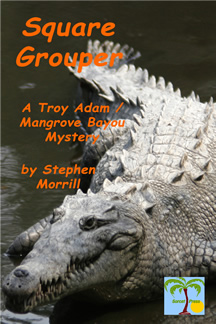 |
I do take time off now and then for canoeing in some swamp or sailing around Florida, the Bahamas, or some Caribbean Island (I belong to a club for that).
I’ve heard writers say they get “hot” and inspired and just have to keep pounding the keyboard to get it all out while it’s fresh. Good for them. I’m not like that. This is a job and even if I do it at odd times sometimes, I pretty much know what’s on the schedule for each day. This does not mean that I’m not excited. I am. Always. I do keep a notepad bedside for those ideas I get at odd hours. (I used to say to myself, “I’ll remember that in the morning” and I don’t have to tell you how effective that was.)
So, at bottom, I get up each morning excited to get to my computer and get on with my fictional life. I enjoy the results and I hope you do too. |
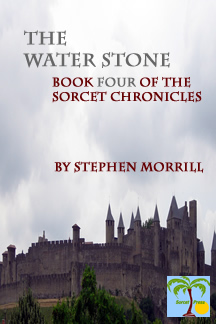 |
When you're not writing, how do you spend your time?
Canoeing in the swamps. I’m one of those few fortunate enough to be attacked by a (very large) alligator. The alligator survived. My canoe got the tooth-holes repaired. I survived with a bad case of poison ivy after the gator chased me up the bank and then ate my Tilly hat. Hope she choked on it.
Sailing. Used to have my own 22-foot boat but now I sail larger boats with my sailing club. I liked my own boat, which was fast and tippy, because when you are afraid of drowning it puts the world and your humdrum daily travails into better perspective.
Yard work. I used to go to a gym every day and work out. But when I left the gym the weights and machines were still the same. Plus it was a 20-minute drive there and back, so I was spending two hours a day at this.
I decided instead to do yard work. Yard work is exercise wherein you can see a result, make a difference. In no time my own yard and bushes was the talk of the neighborhood. I started branching out and now do an elderly woman’s double yard behind me and also sweep the street — three houses each way, both sides — once a week to get the leaves and dirt up. There’s a schedule and I’m full up and I’m in great shape, losing weight, and love getting out in the Florida sun a few hours a day. |
An unexpected side effect: my neighbors were not all so particular about their yards. I never said a word to any of them, just went out and started doing things. Now they all get out too and take better care of their yards and even help me with the weekly street sweeping. We’ve all gotten to know one another better. (As did having a hurricane run over us recently, killing our electricity for most of a week.) |
What are you working on next?
I'm usually working on one or another book (unlike most authors, this is my full-time job) but recently my focus has been on getting seventeen books uploaded and published as e-books:
The Sorcet Chronicles: This is a four-book fantasy and it's done. But I do have the option of further books set in the world of Tessene. I'm thinking of creating a teenage girl and then making her life miserable and dangerous — Tessene is a world not for sissies. Maybe she will meet Tachi, my protagonist from the Sorcet Chronicles. We shall see ... .
The Cord MacIntosh private investigator mysteries. Done two and there’s always room for more. (By the way, Cord also appears in two of the Mangrove Bayou books too. Cross-referencing protagonists between book series. 'Way cool!) Stay tuned .... |
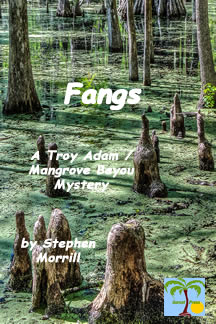 |
The Troy Adam / Mangrove Bayou police procedural mysteries. Six books written. Complicated plots but I have a file folder full of ideas. I actually started number seven in the series but halted work on that to get these other books up and available. I'll get back to it soon ... .
Writing advice. I have five courses I used to teach for my online writing school (now closed) and I think the lessons, rewritten, combined, would make dandy how-to books. That’s a future project.
Could you describe for readers Troy Adam’s internal struggle as he faces the challenges of how he is viewed by others in the town? How do you see him changing from the first installment to the current one
In the first of the Mangrove Bayou books he’s introduced as suffering from psychological trauma, bad dreams, vomiting, and so on, all stemming from his having shot several people in his previous police job. That continues in the second book and gets more complicated. But he will eventually heal, aided by a psychologist and weekly visits.
He’s also shown to be an orphan, abandoned at birth by a black prostitute, and he’s a mix of Caucasian, black, and Asian. The mayor of Mangrove Bayou says he’s, “Beige. A good color that goes with any furniture.” As for the townspeople, they were not terribly happy to see a mixed-race police chief at first. But over time they just got accustomed to him. And he is so much better than his predecessor that they do appreciate that.
The town council also appreciates that he has upgraded the professionalism of the department. Troy Adam also has a serious girlfriend. I made her a pilot with her own small charter flight business because I wanted him to have transportation of that sort when necessary. Will they get more serious? Marry? Only time will tell. Stay tuned.
The town of Mangrove Bayou sounds magical. Is it a real place? Or did you change the name of another small town that inspired you?
Ah. Good story: First off, it’s a combination of Cedar Key and Everglades City, both in Florida and both towns I visit frequently to canoe or sail. I even tried moving to Everglades City but had to give it up because they had no Internet access—at least back then. Seriously. The reference in the books to the microwave tower standing in a circle in the middle of the main access road is a direct description of the tower at Everglades City.
Odd fact: the area between Everglades City and Miami is so remote that the Post Office had never assigned ZIP codes. I guess alligators don't get mail ...
When I wrote the first two book manuscripts, the town name was Mangrove Bay. Then I thought it would be a good idea to have a website. But MangroveBay(dot)com was taken. I was bummed out but discovered that if I added two vowels—O and U—I could have the URL of www.MangroveBayou.com. So I did that and did a search-and-replace of the town name in the book manuscripts.
Sometimes place can be as much a character in a novel as the people. Does this also ring true of Mangrove Bayou?
I certainly think the town is a character in itself. I made up a large map of the town and I refer to that often when writing. But it’s not just the physical town layout. A town is buildings and residents. The characters that people Mangrove Bayou are all odd in one way or another. And I usually try to write ”against type” to make them more three-dimensional and interesting. A police chief in a southern town who’s not a dumb cracker but a northern-born, mixed-race, high-IQ reader of ancient history books. An owner of a restaurant who calls the animals he catches as the town trapper ”chicken” and who doesn’t eat in his own restaurant. A redneck fishing guide who references Joseph Conrad or Charles Dickens in his speech. In a later book I introduce a black gang leader with a Ph.D. in Shakespearean plays. He quotes Othello a lot. That was fun to write.
Do you take liberties with your setting? Or do you try to be true to its Everglades geography and local environment?
The geography and plant and animal life are accurate. I have spent a lot of time on the Everglades sawgrass prairie, in the mangrove forests along the coast, and in cypress swamps around Florida and southern Georgia. I know them all well. I used to guide canoeing parties through the Ten Thousand Islands area or down the Wilderness Waterway from Everglades City to Flamingo. I tend to put in a lot of plant and wildlife description inmy books and my editor tells me to "Take out all that Mutual of Omaha stuff" but I leave some anyway. |
|
